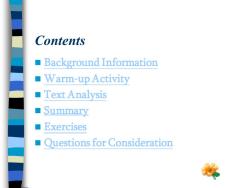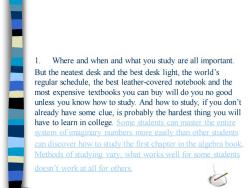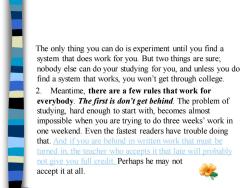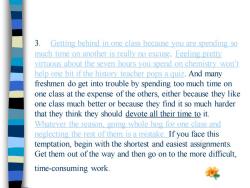吉林大学:《大学英语泛读》课程PPT教学课件(book 3)Unit 1 Reading for A’s

Unit One 1.Reading for A's
Unit One 1. Reading for A’s

Contents Background Information Warm-up Activity ■ Text Analysis ■ Summary ■ Exercises Questions for Consideration
Contents ◼ Background Information ◼ Warm-up Activity ◼ Text Analysis ◼ Summary ◼ Exercises ◼ Questions for Consideration

Information Related to the Text ■ In the United States and some Western countries,textbooks in public elementary and middle school belong to the school.They are issued to the students.The students must not write on any page or mark any part of the textbook in any way,except for cheap paperbacks.When a textbook is issued or returned,its condition must be recorded in terms of New,Fair and Poor.In contrast,textbooks in colleges are bought by the individual students;they can cost about $200 a semester.Many students,however,buy used textbooks sold by former students
Information Related to the Text ◼ In the United States and some Western countries, textbooks in public elementary and middle school belong to the school. They are issued to the students. The students must not write on any page or mark any part of the textbook in any way, except for cheap paperbacks. When a textbook is issued or returned, its condition must be recorded in terms of New, Fair and Poor. In contrast, textbooks in colleges are bought by the individual students; they can cost about $200 a semester. Many students, however, buy used textbooks sold by former students

Grading syste恤 The following grading system is used in most colleges or universities in the United States:A,Excellent;B,Good;C, Satisfactory;D,Low or Pass;E,Fail;L Incomplete;W. Authorized Withdrawal;Z,Unauthorized Withdrawal; P,Pass;NP,No Pass.To maintain satisfactory academic standing and to qualify for a degree,an undergraduate student must have completed courses with the average grades of "C"or above,and a graduate student must have the average grades of a“B”or above
◼ Grading System The following grading system is used in most colleges or universities in the United States: A, Excellent; B, Good; C, Satisfactory; D, Low or Pass; F, Fail; I, Incomplete; W, Authorized Withdrawal; Z, Unauthorized Withdrawal; P, Pass; NP, No Pass. To maintain satisfactory academic standing and to qualify for a degree, an undergraduate student must have completed courses with the average grades of “C” or above, and a graduate student must have the average grades of a “B” or above

Warm-up Activity 1.Did you ever get behind in your study 2.How do you arrange your time for different courses? 3.If you really get behind in one course,what would you do? 4.Do you mark your textbooks?How do you mark them? 5.Are you afraid of tests? 6.What do you do before tests? 装
Warm-up Activity 1.Did you ever get behind in your study ? 2.How do you arrange your time for different courses? 3.If you really get behind in one course, what would you do? 4.Do you mark your textbooks? How do you mark them? 5.Are you afraid of tests? 6.What do you do before tests?

Text When you fail an exam,or when you are lagging behind your classmates in studies,you surely will want to catch up with them.But how? This article discusses three study methods that may lead you to success at college
Text When you fail an exam, or when you are lagging behind your classmates in studies, you surely will want to catch up with them. But how? This article discusses three study methods that may lead you to success at college

1. Where and when and what you study are all important But the neatest desk and the best desk light,the world's regular schedule,the best leather-covered notebook and the most expensive textbooks you can buy will do you no good unless you know how to study.And how to study,if you don't already have some clue,is probably the hardest thing you will have to learn in college.Some students can master the entire system of imaginary numbers more easily than other students can discover how to study the first chapter in the algebra book. Methods of studying vary:what works well for some students doesn't work at all for others
1. Where and when and what you study are all important. But the neatest desk and the best desk light, the world’s regular schedule, the best leather-covered notebook and the most expensive textbooks you can buy will do you no good unless you know how to study. And how to study, if you don’t already have some clue, is probably the hardest thing you will have to learn in college. Some students can master the entire system of imaginary numbers more easily than other students can discover how to study the first chapter in the algebra book. Methods of studying vary; what works well for some students doesn’t work at all for others

The only thing you can do is experiment until you find a system that does work for you.But two things are sure; nobody else can do your studying for you,and unless you do find a system that works,you won't get through college 2.Meantime,there are a few rules that work for everybody.The first is don't get behind.The problem of studying,hard enough to start with,becomes almost impossible when you are trying to do three weeks'work in one weekend.Even the fastest readers have trouble doing that.And if you are behind in written work that must be turned in,the teacher who accepts it that late will probably not give you full credit.Perhaps he may not accept it at all
The only thing you can do is experiment until you find a system that does work for you. But two things are sure; nobody else can do your studying for you, and unless you do find a system that works, you won’t get through college. 2. Meantime, there are a few rules that work for everybody. The first is don’t get behind. The problem of studying, hard enough to start with, becomes almost impossible when you are trying to do three weeks’ work in one weekend. Even the fastest readers have trouble doing that. And if you are behind in written work that must be turned in, the teacher who accepts it that late will probably not give you full credit. Perhaps he may not accept it at all

3 Getting behind in one class because you are spending so much time on another is really no excuse. Feeling pretty virtuous about the seven hours you spend on chemistry won't help one bit if the history teacher pops a quiz.And many freshmen do get into trouble by spending too much time on one class at the expense of the others,either because they like one class much better or because they find it so much harder that they think they should devote all their time to it. Whatever the reason,going whole hog for one class and neglecting the rest of them is a mistake.If you face this temptation,begin with the shortest and easiest assignments. Get them out of the way and then go on to the more difficult, time-consuming work
3. Getting behind in one class because you are spending so much time on another is really no excuse. Feeling pretty virtuous about the seven hours you spend on chemistry won’t help one bit if the history teacher pops a quiz. And many freshmen do get into trouble by spending too much time on one class at the expense of the others, either because they like one class much better or because they find it so much harder that they think they should devote all their time to it. Whatever the reason, going whole hog for one class and neglecting the rest of them is a mistake. If you face this temptation, begin with the shortest and easiest assignments. Get them out of the way and then go on to the more difficult, time-consuming work

Unless you do the easy work first,you are likely to spend so much time on the long,hard work that when midnight comes,you'll say to yourself,"Oh,that English assignment was so easy,I can do it any time,"and go on to bed.The English assignment,easy as it was.won't get done. 4. If everything seems equally easy (or equally hard). leave whatever you like best until the end.There will be more incentive at half past eleven to read a political science article that sounded really interesting than to begin memorizing French irregular verbs.a necessary task that strikes you as pretty dull
Unless you do the easy work first, you are likely to spend so much time on the long, hard work that when midnight comes, you’ll say to yourself, “Oh, that English assignment was so easy, I can do it any time,” and go on to bed. The English assignment, easy as it was, won’t get done. 4. If everything seems equally easy (or equally hard), leave whatever you like best until the end. There will be more incentive at half past eleven to read a political science article that sounded really interesting than to begin memorizing French irregular verbs, a necessary task that strikes you as pretty dull
按次数下载不扣除下载券;
注册用户24小时内重复下载只扣除一次;
顺序:VIP每日次数-->可用次数-->下载券;
- 吉林大学:《商务英语选读》课程电子教案(PPT课件)Unit 8 Text c Case Study - Oral Communication.ppt
- 吉林大学:《商务英语选读》课程电子教案(PPT课件)Unit 8 Text b Case Study - Communication Skills.ppt
- 吉林大学:《商务英语选读》课程电子教案(PPT课件)Unit 8 Text a Guides to Good Intercultural Communication.ppt
- 吉林大学:《商务英语选读》课程电子教案(PPT课件)Unit 7 Text c Cultural Differences.ppt
- 吉林大学:《商务英语选读》课程电子教案(PPT课件)Unit 7 Text b Written Communication.ppt
- 吉林大学:《商务英语选读》课程电子教案(PPT课件)Unit 7 Text a Barrier to International communication.ppt
- 吉林大学:《商务英语选读》课程电子教案(PPT课件)Unit 6 Text c Culture and Communication.ppt
- 吉林大学:《商务英语选读》课程电子教案(PPT课件)Unit 6 Text b Business Communication.ppt
- 吉林大学:《商务英语选读》课程电子教案(PPT课件)Unit 6 Text a How to Understand Body Language.ppt
- 吉林大学:《商务英语选读》课程电子教案(PPT课件)Unit 5 Text c Good Body Language Is Part of Good Communication.ppt
- 吉林大学:《商务英语选读》课程电子教案(PPT课件)Unit 5 Text b Nonverbal Communication.ppt
- 吉林大学:《商务英语选读》课程电子教案(PPT课件)Unit 5 Text a Oral Presentation.ppt
- 吉林大学:《商务英语选读》课程电子教案(PPT课件)Unit 4 Text c How to Argue.ppt
- 吉林大学:《商务英语选读》课程电子教案(PPT课件)Unit 4 Text b Sharpening Your Basic Skills.ppt
- 吉林大学:《商务英语选读》课程电子教案(PPT课件)Unit 4 Text a Suggestions for Effective Listening.ppt
- 吉林大学:《商务英语选读》课程电子教案(PPT课件)Unit 3 Text c The Importance of Listening.ppt
- 吉林大学:《商务英语选读》课程电子教案(PPT课件)Unit 3 Text b How Can You Develop Effective Communication Skills?.ppt
- 吉林大学:《商务英语选读》课程电子教案(PPT课件)Unit 3 Text a Functions of On-the-job Communication.ppt
- 吉林大学:《商务英语选读》课程电子教案(PPT课件)Unit 2 Text c Levels of Communication.ppt
- 吉林大学:《商务英语选读》课程电子教案(PPT课件)Unit 2 Text b How to Start a Conversation in Britain.ppt
- 吉林大学:《大学英语泛读》课程PPT教学课件(book 3)Unit 2 Why Not Speed Up Your Reading?.ppt
- 吉林大学:《大学英语泛读》课程PPT教学课件(book 3)Unit 3 Romantic Roundabout.ppt
- 吉林大学:《大学英语泛读》课程PPT教学课件(book 3)Unit 4 The Lucky Archaeologist.ppt
- 吉林大学:《大学英语泛读》课程PPT教学课件(book 3)Unit 5 News of the Engagement.ppt
- 吉林大学:《大学英语泛读》课程PPT教学课件(book 3)Unit 6 The Story of Jazz.ppt
- 吉林大学:《大学英语泛读》课程PPT教学课件(book 3)Unit 7 The Experiences of a Chinese Immigrant, 1880-1903.ppt
- 吉林大学:《大学英语泛读》课程PPT教学课件(book 3)Unit 8 How to Guess Your Age.ppt
- 吉林大学:《大学英语泛读》课程PPT教学课件(book 3)Unit 9 The Sixth Sense.ppt
- 吉林大学:《大学英语泛读》课程PPT教学课件(book 3)Unit 10 Long Walk to Forever.ppt
- 吉林大学:《大学英语泛读》课程PPT教学课件(book 3)Unit 11 Father and Son.ppt
- 吉林大学:《大学英语泛读》课程PPT教学课件(book 3)Unit 13 I Thought About This Girl.ppt
- 吉林大学:《大学英语泛读》课程PPT教学课件(book 3)Unit 14 The Gift of understanding.ppt
- 吉林大学:《大学英语泛读》课程PPT教学课件(book 3)Unit 15 A Horrible Experience.ppt
- 吉林大学:《大学英语泛读》课程PPT教学课件(book 3)Unit 16 Exercise and Health(一).ppt
- 吉林大学:《大学英语泛读》课程PPT教学课件(book 3)Unit 17 Exercise and Health(二).ppt
- 吉林大学:《大学英语泛读》课程PPT教学课件(book 3)Unit 18 My Sixth Christmas.ppt
- 吉林大学:《大学英语泛读》课程PPT教学课件(book 3)Unit 19 The Sacrifice at Masada.ppt
- 吉林大学:《大学英语泛读》课程PPT教学课件(book 3)Unit 20 Covered Wagon Days.ppt
- 吉林大学:《大学英语泛读》课程PPT教学课件(book 3)Unit 21 Education? Computer, Naturally.ppt
- 吉林大学:《大学英语泛读》课程PPT教学课件(book 3)Unit 22 Living as a Navajo.ppt
